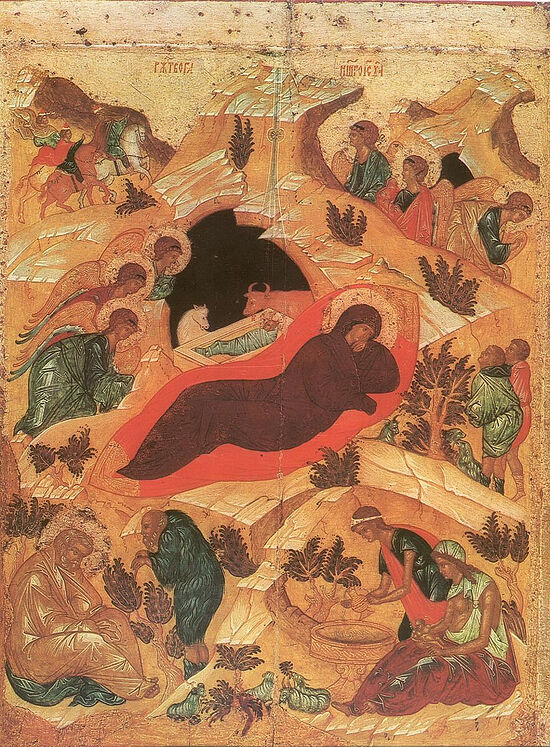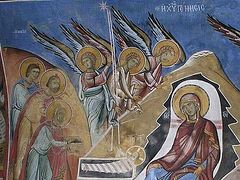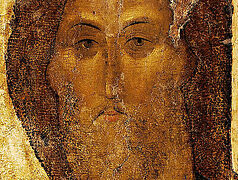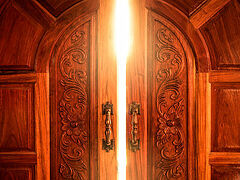On the eve of the Nativity of Christ, the Holy Church completes its preparations for the great feast. There are several Old Testament readings at the evening service. Here are some of them.
Micah 5:2-4
But thou, Bethlehem Ephratah, though thou be little among the thousands of Judah, yet out of thee shall He come forth unto Me that is to be ruler in Israel; whose goings forth have been from of old, from everlasting. Therefore will He give them up, until the time that she which travaileth hath brought forth: then the remnant of His brethren shall return unto the children of Israel. And He shall stand and feed in the strength of the Lord, in the majesty of the name of the Lord His God; and they shall abide: for now shall He be great unto the ends of the earth.
This reading from the First Hour is dedicated to the prophecy of Micah about the birth of Christ in the city of Bethlehem.
Bethlehem, one of the most ancient cities, was the birthplace of David. It’s located six and a half miles to the south of Jerusalem. Originally it was called the House of Ephratah, because one of the progenitors of the residents of this city was Ephratah, the great-grandson of Judah (1 Chron. 4:1-4). This city was insignificant in terms of the number of inhabitants, but it was there that the Savior, the Messiah was to be born. He was awaited not just as a king ruling over His people, but as a deliverer Who would unite those who dream not of earthly dominion, but who are able to see in Him the messenger of God to Whom is given the Kingdom above all nations.
The fact that He is born on the ancient land of King David is a special joy for everyone awaiting His appearance. All those who come to believe will be one flock with one Shepherd. He will stand guard, vigilantly watching that no one gets lost, falls behind, or strays. He will guard and protect His flock; therefore, for those faithful to Him, it will be a joy to live with Him, to share in His glory and majesty. He will eventually overcome all resistance and will shine unto the ends of the earth.
The prophet foretold the birth of the Savior 700 years ahead of time so the people might live in hope. This prophecy is read both at the First Hour and at Vespers, where a few more lines are added about mercy for the “daughter of Zion,” that is, for all the Israelite people. For unfaithfulness to God, this people will be scattered as the wind scatters broken branches, but then the Lord will take pity upon them (if they humble themselves and repent), and preserve a faithful remnant. But this doesn’t apply to the Jews alone, but to all who believe.
Faith in Christ gives the rights of the chosen people to all, and therefore this is said about the New Israel, that is, about the Church of Christ. The “remnant,” that is, the spiritual heirs of the Israelites who were faithful to Christ, together with those among the nations who come to believe in Christ, will make up the Church, which the gates of hell won’t overcome, because it’s Christ Himself Who will preserve and protect it.
Isaiah 7:10-16, 8:1-4, 8-10
Moreover the LORD spake again unto Ahaz, saying, Ask thee a sign of the LORD thy God; ask it either in the depth, or in the height above. But Ahaz said, I will not ask, neither will I tempt the LORD. And he said, Hear ye now, O house of David; Is it a small thing for you to weary men, but will ye weary my God also? Therefore the Lord Himself shall give you a sign; Behold, a virgin shall conceive, and bear a son, and shall call His name Immanuel. Butter and honey shall He eat, that He may know to refuse the evil, and choose the good. For before the child shall know to refuse the evil, and choose the good, the land that thou abhorrest shall be forsaken of both her kings. Moreover the LORD said unto me, Take thee a great roll, and write in it with a man’s pen concerning Mahershalalhashbaz. And I took unto me faithful witnesses to record, Uriah the priest, and Zechariah the son of Jeberechiah. And I went unto the prophetess; and she conceived, and bare a son. Then said the LORD to me, Call his name Mahershalalhashbaz. For before the child shall have knowledge to cry, My father, and my mother, the riches of Damascus and the spoil of Samaria shall be taken away before the king of Assyria. And he shall pass through Judah; he shall overflow and go over, he shall reach even to the neck; and the stretching out of his wings shall fill the breadth of Thy land, O Immanuel. Associate yourselves, O ye people, and ye shall be broken in pieces; and give ear, all ye of far countries: gird yourselves, and ye shall be broken in pieces; gird yourselves, and ye shall be broken in pieces. Take counsel together, and it shall come to nought; speak the word, and it shall not stand: for God is with us.
This reading from the Sixth Hour includes the prophecy of Isaiah about Immanuel. It begins with the offer of a sign from God through the prophet to King Ahaz. For what? To assure the wicked king that the Lord hasn’t abandoned His children. He’s able to protect them. This was said in a period of serious military danger. Ahaz said that he wouldn’t break any of the commandments (Ye shall not tempt the LORD your God—Deut. 6:16). Divine help was, in his eyes, something unreal; he didn’t believe in it and didn’t hope for it. It seemed more reliable to him to negotiate with the king of Assyria, whom he was going to send an ambassador to with gifts (4 Kg. 16:7). To this, the prophet said that they only complicate his life, preventing the Lord from helping and preserving them. “They” doesn’t refer to Ahaz alone, but all the people of David. They all share in the unbelief of their king. And despite this, the prophet emphasized that if they don’t think about God, then God thinks about them.
The sign of His mercy will be revealed to the House of David, and it will become clear from this manifestation that the hostile plans of the Syrian and Israeli kings will not be crowned with success. This sign will be the Virgin giving birth to Immanuel, which means, “God is with us!” God will be with His people, God will be a descendant of David; God will be the Son of the Virgin. His appearance in the world will be marked by a miracle. The Deliverer’s name shall be Jesus. Immanuel is a household name and has many other meanings (for example, “Angel of Great Counsel,” or “Father of the Age to Come,” and so on).
How could such a sign, which will be fulfilled only in 700 years, bring joy to people who are afraid of war and defeat at the hands of the allied forces in the nearest future? By the fact that the very coming of God in the flesh into the world is comforting, but even more so by the fact He will be born (whenever it happens) into the family of David. That means—and everyone will understand this already—no wars will destroy this family. That He will be born of a Virgin is as it should be; after all, the appearance of God in the world should be miraculous, supernatural.
Speaking of Immanuel, the prophet emphasized that He will be both true God and man like everyone else. In infancy, He’ll need food, like all babies, until they grow up enough to be able to distinguish good from evil. Of all the necessary food, the prophet names butter and honey as the most nourishing and valuable in infancy. A characteristic feature of the Divine Child will be even an unconscious aversion from all guile and a desire for the good.
Returning again to the anxious expectation of an attack from the Israeli and Syrian kings who had united for this purpose, the Prophet Isaiah transmits the Lord’s command to write a scroll, that is, to take a large new sheet of parchment (such sheets were then rolled up into a scroll) and write: “Maher-shalal-hash-baz” (that is, “speed-spoil-hasten-plunder”). It should be understood this way: The kingdoms threatening Judea will be plundered and become the prey of Assyria.
The prophet took two people as witnesses: the priest Uriah and the Levite Zechariah. They were respected by everyone. The word written on the scroll was the name of the prophet’s son, who was born at this time. The threatening prophecy was to be fulfilled even before the time when his son would learn to say “mama.” The fulfillment of this prophecy is narrated by 4 Kings (16:7-9) and 2 Chronicles (28:16).
“God is with us.” These and the following words sound like a hymn that’s especially dear to those who hope in God’s help. This must be remembered by those who rise up against God’s faithful, and those who seek this loyalty, which is not in words, but in the power of faith.
Isaiah 11:1-10
And there shall come forth a rod out of the stem of Jesse, and a Branch shall grow out of his roots. And the spirit of the LORD shall rest upon Him, the spirit of wisdom and understanding, the spirit of counsel and might, the spirit of knowledge and of the fear of the LORD; And shall make Him of quick understanding in the fear of the LORD: and He shall not judge after the sight of his eyes, neither reprove after the hearing of his ears: But with righteousness shall He judge the poor, and reprove with equity for the meek of the earth: and He shall smite the earth: with the rod of His mouth, and with the breath of His lips shall He slay the wicked. And righteousness shall be the girdle of his loins, and faithfulness the girdle of His reins. The wolf also shall dwell with the lamb, and the leopard shall lie down with the kid; and the calf and the young lion and the fatling together; and a little child shall lead them. And the cow and the bear shall feed; their young ones shall lie down together: and the lion shall eat straw like the ox. And the sucking child shall play on the hole of the asp, and the weaned child shall put his hand on the cockatrice’ den. They shall not hurt nor destroy in all My holy mountain: for the earth shall be full of the knowledge of the LORD, as the waters cover the sea. And in that day there shall be a root of Jesse, which shall stand for an ensign of the people; to it shall the Gentiles seek: and His rest shall be glorious.
The word of the Prophet Isaiah about the Messiah as a rod out of the stem of Jesse constitutes the fourth reading.
Jesse was a simple citizen of Bethlehem. David, his son, became king. Subsequently, all the kings were from the family of David until the Babylonian captivity. After the captivity, the throne of David sat empty. From the great royal tree there remained but the root. But it was revealed to David by God that his throne wouldn’t be destroyed, that from him would come a great descendant who would not only renew the glory of his bloodline, but most importantly, would renew and quicken all of mankind.
This outgrowth from the ancient root, or the Branch of the root of Jesse is Christ the Savior. He was born during an extreme impoverishment of this line. Poverty, defenselessness, and a lack of even the most necessary means of living led to the fact that the descendant of the king had no place among the people and they had to look for a place for the Newborn in a cattle pen. However, it was He Who was to accomplish the greatest revolution in the fate of mankind. For this, He needs strength from God, like none other. Therefore, we hear Isaiah talking about the Spirit of God given Him, Who will ever be with Him.
This will be expressed above all in the gift of wisdom and understanding. It would seem that these concepts are very close, but in wisdom the prophet sees the highest degree of the perception of Truth, and in understanding—the ability to apply this knowledge in practice. The spirit of counsel is also needed to do the right thing, unerringly. Might is also needed to carry out a decision. Also necessary is the spirit of knowledge, so that the worship and piety flowing from it might be true. All of the necessary spiritual gifts to Christ as man are completed and crowned with the fear of God. It alone carries all the rest. Without it, reverence, humility, and worship are impossible.
He Himself will judge not by glory, that is, regardless of the social position or the opinion of others about a man, but according to the heart of every man, which is open to God. The judgment of God is just and impartial. The end of this reading paints for us the bliss of Paradise, which is possible only among those faithful to God, when peace and love will reign in the society of Christians and there will be no fear of violence or treachery. Literally, it will be fulfilled only when the Lord with the breath of His lips shall slay the wicked, that is, the Antichrist.
Those faithful to the Lord will be in all My holy mountain, having overcome all weaknesses and vices, good-naturedly, guilelessly, simple, pure, sincere, obedient to the one shepherd—Christ. Why are holiness and blessedness inseparable from the mountain? The “holy mountain” is the Church. In antiquity, Mt. Zion and the Temple crowning it merged into a single idea of a place of the special presence of God. The whole earth will know the Lord, and this will correct minds and hearts, and make everyone meek and life peaceful and joyful. Perhaps this will be because the Messiah prophesied by the prophets will be not the earthly ruler of the universe, but the Pre-Eternal God, the Savior of the world. Faith in Him, hope in Him, and love for Him will make the whole new world the Universal Church and those faithful to Him—blessed.




